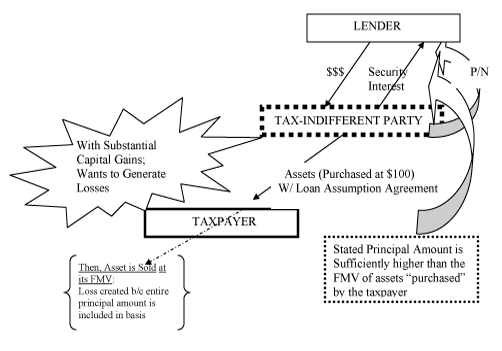LISTED TRANSACTIONS
Listed Transaction #14
(Cards-Loan Assumption)
Abusive Basis-Shifting Devices
Using Loan Assumption Agreements
Notice 2002-21

In these settings, the IRS believes that taxpayers with substantial capital gains are approached with a plan that will generate capital losses (to offset the gains) through basis-shifting using loan assumption agreements that suggest that the taxpayer must include the entire amount of debt assumed in a purchase (even if this is in excess of the fair market value of the assets acquired). However, the IRS notes how this technique is predicated on the assumption that the liabilities will be paid in full by the buyer. The IRS uses this notice to remind practitioners and taxpayers that in appropriate cases, the courts have rejected attempts to assign an inflated basis to property, choosing instead to limit the basis of the property acquired to its fair market value.
The IRS further reminds practitioners and taxpayers that courts have refused to allow taxpayers to inflate basis on a purchase, above fair market value, where a transaction is “not conducted at arm’s-length by two economically self-interested parties or where a transaction is based upon ‘peculiar circumstances’ which influence the purchaser to agree to a price in excess of the property’s fair market value” (citing, inter alia, to Lemmen v. IRS, 77 T.C. 1326 (1981)). Alternatively, courts have limited the portion of the indebtedness that may be taken into account, based on all the facts and circumstances, including the economic realities of the situation and the parties’ expectations as to how the liabilities will be paid.
The IRS will utilize these principles in an appropriate situation to conform the transaction to the economic realities and limit the taxpayer’s basis at purchase to the fair market value of the assets acquired. By doing so, any subsequent loss claimed by the taxpayer upon a disposition of the assets (or entity holding the assets or interest represented thereby) is subject to disallowance. Participants in the above referenced transaction (or a transaction substantially similar thereto) face imposition of various penalties (e.g., the accuracy-related penalty, the return preparer penalty, the promoter penalty, and the aiding and abetting penalty) and taxpayers who have filed returns on which they claimed tax losses which the IRS views as dubious are encouraged to file amended returns.
If you believe that you may have engaged in a transaction that is the same or substantially similar to the transaction described above, Federal law may require you to disclose your and other parties’ participation in any such “listed transaction” on IRS Form 8886. For more information about Federal law requirements, please contact us.
